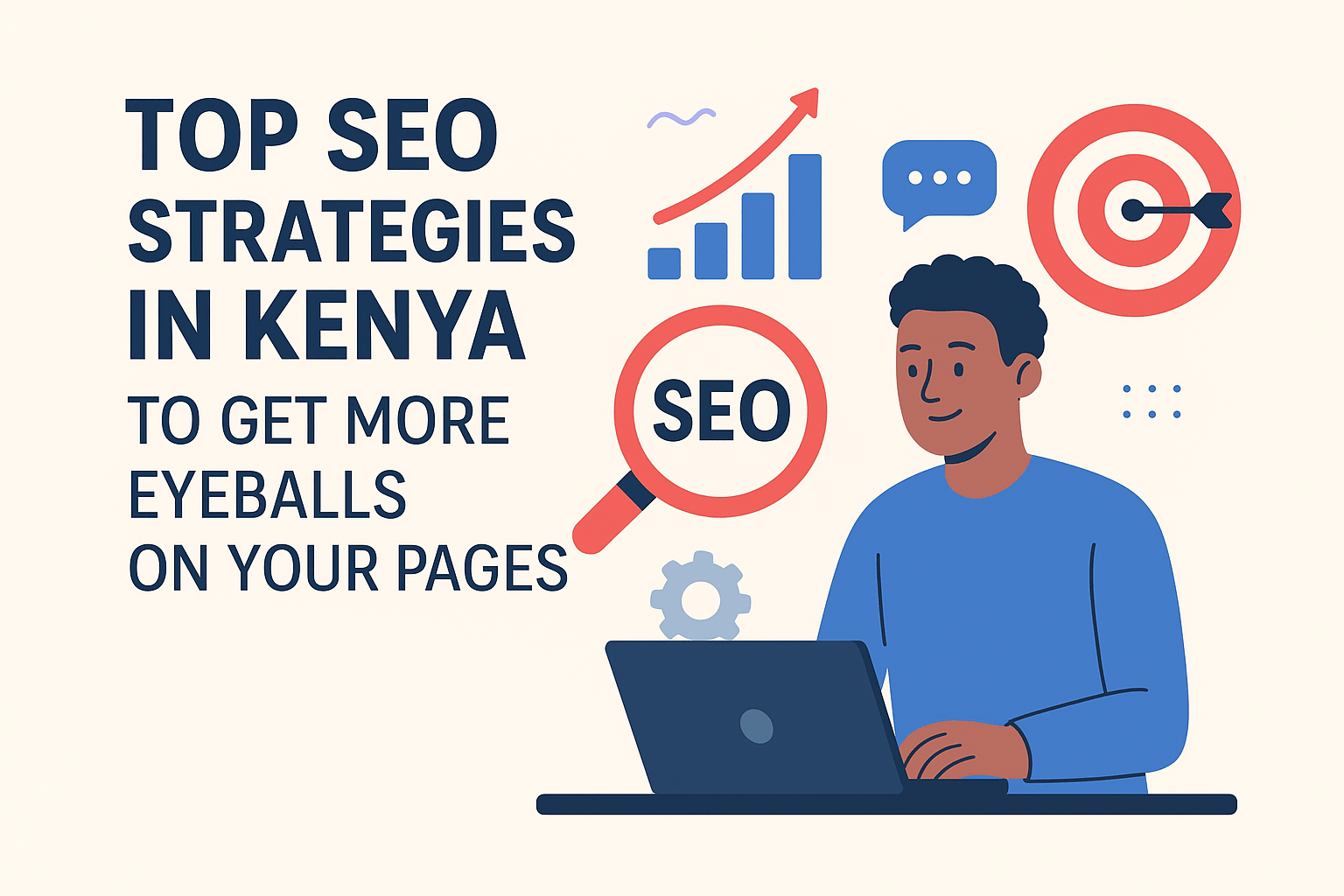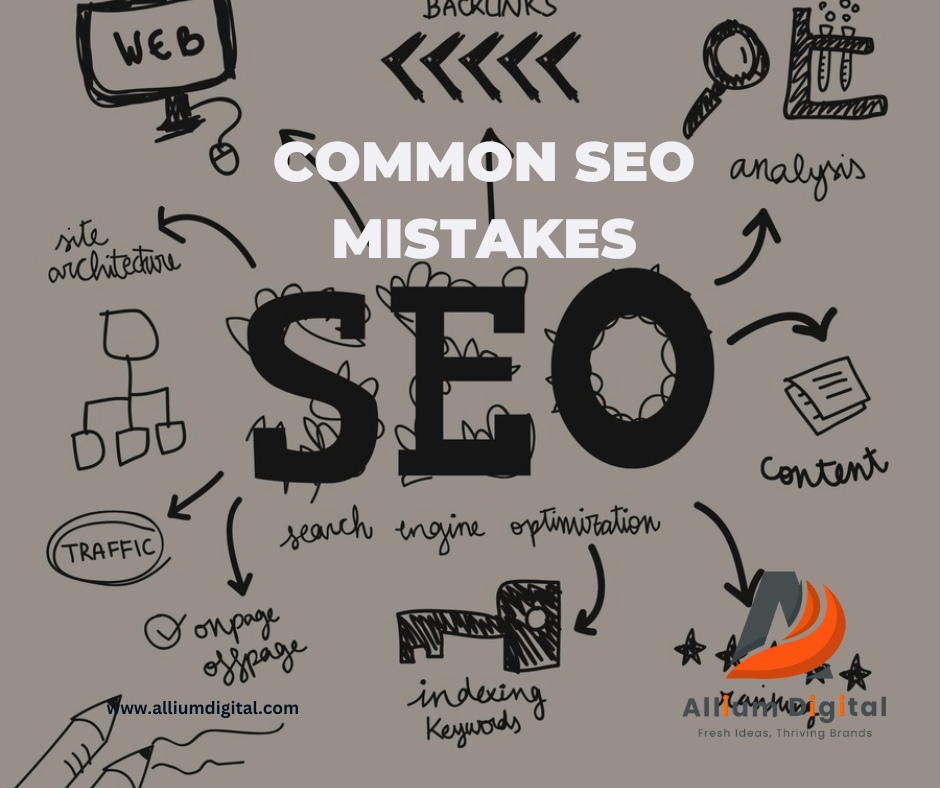This guide explores the most effective SEO strategies in Kenya for businesses looking to boost online visibility.
In Kenya, digital visibility is no longer optional, it’s the lifeline of modern business. From Nairobi to Mombasa, Kisumu to Eldoret, businesses are increasingly shifting online as consumers rely on the internet for everything: booking a matatu ticket, finding affordable real estate, checking MPESA rates, or comparing smartphone prices.
You’re invisible to your target audience if your business doesn’t appear in these searches.
SEO (Search Engine Optimization) is the key that unlocks this visibility. In Kenya, where over 85% of internet users access the web through mobile devices, ranking well on Google (or even Bing) is crucial.
Think about it: How often do you search for “best nyama choma restaurant near me” or “affordable salon Nairobi”? These queries represent opportunities for businesses to capture attention and drive sales.
For small and medium businesses, SEO levels the playing field. A local boda-boda delivery service in Kisumu can compete online with bigger logistics companies if its website is well-optimized. Similarly, a boutique hotel in Diani can attract international tourists searching for “best beach resorts in Kenya” if its SEO strategy is strong.
In short, SEO in Kenya isn’t just about global visibility, it’s about reaching the right audience at the right time, whether locals searching in Swahili or tourists Googling in English.
- Why SEO is More Important Than Ever in Kenya
- Understanding How Search Engines Work in Kenya
- Keyword Research – The Foundation of SEO in Kenya
- On-Page SEO Techniques That Boost Rankings in Kenya
- Content is King – Creating High-Quality Content for Kenyan Audiences
- Why Mobile SEO Matters in Kenya
- Technical SEO for Kenyan Websites
- The Power of Local SEO in Kenya
- Link Building Strategies That Work in Kenya
- Leveraging Social Media for SEO Growth in Kenya
- The Role of Analytics in SEO Success
- Voice Search Optimization in Kenya
- E-Commerce SEO for Kenyan Businesses
- Common SEO Mistakes Kenyan Businesses Make
- Future Trends of SEO in Kenya
- FAQs
- 1. What are the most effective SEO strategies in Kenya for small businesses?
- 2. How long does it take to see results from SEO strategies in Kenya?
- 3. Do I need to hire an SEO expert in Kenya, or can I do it myself?
- 4. Why is mobile SEO considered one of the most critical SEO strategies in Kenya?
- 5. What is the future of SEO strategies in Kenya?
- Conclusion
Why SEO is More Important Than Ever in Kenya
The Kenyan digital landscape has exploded in recent years. With over 43 million internet users and a booming e-commerce scene driven by platforms like Jumia, Jiji, and Kilimall, businesses are fighting for attention more than ever. The rise of social media platforms like TikTok, Facebook, and Instagram also means that attention spans are short and competition for clicks is fierce.
But here’s the catch: social media alone doesn’t guarantee long-term visibility. SEO provides sustainability. A single viral TikTok might bring in traffic for a week, but a well-optimized blog post or service page can rank for months or years, consistently driving customers.
Another critical factor is voice search. Kenyans increasingly use Google Assistant and mobile voice commands to search in English and Swahili. Queries like “M-pesa charges 2025” or “cheap hotels near JKIA” are spoken instead of typed. Businesses that optimize for conversational, localized keywords will dominate this trend.
The demand for credibility also makes SEO vital. When a business ranks high in Google’s results, Kenyan users view it as more trustworthy. Whether you’re a lawyer in Nairobi, a mechanic in Nakuru, or a tour guide in the Maasai Mara, SEO helps establish that trust.
Adopting SEO strategies in Kenya ensures your business stays competitive in a crowded digital space.
The Role of Visibility in Kenyan Online Success
In Kenya, visibility equals survival. Imagine running a shoe shop in Nairobi CBD. You might have the best deals on sneakers, but if people searching “best sneaker shops in Nairobi” don’t see you online, they’ll walk into your competitor’s store instead.
Visibility isn’t just about clicks—it’s about qualified clicks. For example:
- A Nairobi-based real estate agent needs traffic from people searching “affordable apartments in Nairobi West” rather than generic traffic from global users.
- A Kisumu-based hospital should appear when someone types “private hospitals near Kisumu CBD,” not just “hospitals.”
A core part of successful SEO strategies in Kenya is aligning content with user intent.
By targeting location-based searches, businesses can connect with nearby customers ready to act. Google Business Profile listings, maps integration, and local citations (like Kenya Yellow Pages) are goldmines for increasing visibility in a highly targeted way.
Understanding How Search Engines Work in Kenya

To thrive in SEO, Kenyan businesses need to understand how search engines function. Google is the dominant search engine in Kenya, holding over 95% of the market share. That means you’re practically invisible online if you’re not ranking on Google.
Search engines follow three main steps:
- Crawling – Google’s bots scan websites across Kenya (yes, even your business website). If your site has poor structure, broken links, or is not mobile-friendly, it may get ignored.
- Indexing – This is where your content gets added to Google’s “library.” If your Nairobi blog post about “Kenya safari packages” isn’t indexed, it will never appear in search results.
- Ranking – Once a query is typed (or spoken), Google decides which pages are most relevant. Factors include keywords, backlinks, page speed, mobile usability, and user experience.
The Importance of User Intent in Kenya
Kenyan users don’t just search—they search with intent. Understanding this intent can make or break your SEO strategy:
- Informational intent: “What is Huduma Namba?” or “How to register a business in Kenya.”
- Navigational intent: “Equity Bank Kenya login” or “Safaricom self-care portal.”
- Transactional intent: “Buy smartphones online Kenya” or “book safari Kenya.”
You’ll capture more targeted traffic if your content aligns with these intents. For example, a blog post explaining “best M-Pesa Paybill numbers for bills” will attract Kenyans with informational intent. At the same time, an optimized e-commerce page for “cheap smartphones Nairobi” will satisfy transactional intent.
Keyword Research – The Foundation of SEO in Kenya
Keyword research forms the foundation of all strong SEO strategies in Kenya. Keywords are the heartbeat of SEO, and in Kenya, they come with a unique twist. Depending on context, many users search in English, Swahili, or even Sheng. That means Kenyan businesses must think beyond standard English keywords.
How to Find High-Value Keywords in Kenya
High-value keywords in Kenya are those with local relevance, reasonable search volume, and low-to-medium competition. For example:
- “Cheap salons Nairobi CBD” (transactional intent).
- “Best safari tours Kenya 2025” (tourism industry).
- “Laptop repair shop Eldoret” (local service).
Kenyan businesses can target audiences more effectively by focusing on location-specific and service-specific keywords.
Long-Tail vs. Short-Tail Keywords in the Kenyan Market
- Short-tail keywords: “Shoes Kenya,” “Hotels Nairobi.” These are highly competitive, often dominated by big companies.
- Long-tail keywords: “Affordable Nike sneakers Nairobi West” or “3-star hotels near Moi International Airport Mombasa.” These are less competitive but bring in highly targeted, ready-to-convert traffic.
In Kenya’s competitive market, long-tail keywords give SMEs and startups a fair chance to compete.
Tools for Keyword Research in Kenya
Kenyan businesses don’t need expensive tools to get started. Some great options include:
- Google Keyword Planner – Free and reliable for Kenyan search data.
- Ubersuggest – Affordable tool for small businesses in Kenya.
- AnswerThePublic – Helps identify common Kenyan queries.
- Google Trends – Perfect for tracking local search trends, e.g., spikes in searches for “Kenya elections” or “Safaricom bundles.”
On-Page SEO Techniques That Boost Rankings in Kenya
Once you’ve identified the right keywords, the next step is on-page optimization. This ensures that every page of your Kenyan website is search-friendly.
Optimizing Title Tags and Meta Descriptions
Your title tag and meta description are your first sales pitch in Kenya, where search competition is fierce in industries like real estate and e-commerce. For example:
- Title: “Affordable Apartments in Nairobi West – Rent from KSh 15,000”
- Meta: “Find budget-friendly apartments in Nairobi West. Explore verified listings, flexible payment options, and prime locations. Book your visit today!”
These improve click-through rates and show relevance to Kenyan users searching in real time.
The Role of Headers and Subheaders
Headers help both readers and Google understand your content. For a blog post on “Best Nyama Choma Spots in Nairobi,” H2s could include:
- H2: “Affordable Nyama Choma Joints in Nairobi”
- H2: “Best Family-Friendly Nyama Choma Restaurants”
- H2: “Nyama Choma with Nightlife Experience in Nairobi”
This makes the page readable, organized, and locally relevant.
Keyword Placement and Density
Keyword stuffing doesn’t work in Kenya (or anywhere else). Instead, focus on strategic keyword placement in:
- The first 100 words (e.g., “Looking for affordable hair salons in Nairobi CBD?”).
- At least one H2 header.
- Image alt text (e.g., “Kenya safari jeep in Maasai Mara”).
- The conclusion (to reinforce relevance).
On-page optimization remains one of the timeless SEO strategies in Kenya. Keeping your keywords natural and user-focused will prevent penalties and improve rankings.

Content is King – Creating High-Quality Content for Kenyan Audiences
In Kenya, quality content makes all the difference. Content keeps users engaged, whether it’s a travel blog targeting international tourists or a local hardware store website in Nakuru.
Writing for Humans and Search Engines in Kenya
Kenyan audiences value practical, clear information. If you’re writing about “M-Pesa business paybill registration,” avoid jargon and walk readers step by step through the process. The goal is to balance keyword optimization with readability.
The Importance of Content Freshness in Kenya
Kenyan search behaviors are dynamic. For example, people rush to Google when Safaricom updates its bundles or the government changes policies. Updating your blogs and guides with the latest info ensures you stay relevant.
Using Multimedia for Better Engagement
Kenyan users love multimedia. Adding:
- Photos of Kenyan landmarks, products, or events make your site more relatable.
- Videos (like a virtual tour of a Nairobi apartment or a Maasai Mara safari experience) increase dwell time.
- Infographics (like simplified guides to Huduma services) help explain complex processes quickly.
The more engaging your content, the more likely Kenyans will share it on platforms like WhatsApp, Facebook, or Twitter (X).
Why Mobile SEO Matters in Kenya
Kenya is a mobile-first economy. With Safaricom leading the charge and nearly everyone carrying a smartphone, mobile internet is how Kenyans access almost every online service, from paying bills via M-Pesa to browsing Jumia for deals. According to recent data, over 85% of internet access in Kenya happens through mobile devices. This makes mobile SEO not just important but essential.
If your website isn’t optimized for mobile, you’re losing out on the majority of Kenyan users. Imagine someone in Kisumu searching “best car hire services near m,e” but your site takes 10 seconds to load and looks distorted on their phone. They’ll hit back instantly and click on your competitor’s site.
What Mobile SEO Means for Kenya
- Mobile-Friendly Design – Websites must adapt to different screen sizes. Responsive design is a must.
- Fast Load Speeds – Slow sites frustrate Kenyan users who may not always have the fastest internet connection. Compressing images, enabling caching, and using lightweight themes help.
- Click-to-Call Buttons – Many Kenyans prefer calling directly. Adding tap-to-call features boosts conversions for services like salons, plumbers, or taxi companies.
- Mobile Payment Integration – With M-Pesa being central to Kenya’s economy, websites that integrate M-Pesa and other mobile payment options convert far better.
In short, mobile SEO in Kenya is about accessibility, speed, and convenience. A website that feels clunky on mobile is the digital equivalent of a shop that’s too hard to find in Nairobi’s CBD, it turns customers away.
Technical SEO for Kenyan Websites
While keyword placement and good content matter, technical SEO forms the backbone of a successful website in Kenya. Many Kenyan businesses set up flashy websites but ignore the backend, which can cost them visibility.
Key Elements of Technical SEO for Kenya
- Site Speed – Kenyan users don’t wait. If a page takes more than 3 seconds to load, most visitors drop off. Tools like Google PageSpeed Insights and GTmetrix help measure performance.
- Secure Websites (HTTPS) – Security is a big trust factor. A Nairobi-based bank or e-commerce site without HTTPS risks losing customers.
- XML Sitemaps – Helps Google understand your site structure, making it easier to crawl and rank.
- Mobile Optimization – As covered above, essential for Kenya’s mobile-first audience.
- Fixing Broken Links – Many Kenyan websites suffer from 404 errors and outdated links. These frustrate users and harm SEO.
Why Technical SEO Matters in Kenya
Imagine an e-commerce site in Nairobi selling electronics. If the checkout page doesn’t load properly, the business not only loses sales but also rankings. Google prioritizes user experience, so a technically sound website is rewarded with better visibility.
For local SMEs, hiring an SEO consultant or web developer to handle these technical issues can make the difference between ranking on page 1 or being buried on page 5.

The Power of Local SEO in Kenya
Local SEO is where Kenyan businesses can shine. Unlike global SEO, which pits you against international giants, local SEO focuses on targeting customers in your area, the ones who are most likely to convert.
Why Local SEO is Critical in Kenya
- Mobile “Near Me” Searches – Queries like “pharmacy near me” or “butchery Nairobi” are extremely common.
- Google Maps Integration – Most Kenyans rely on maps for directions to businesses. Appearing on Google Maps boosts trust and visibility.
- Local Directories – Listings in platforms like Yellow Pages Kenya, Jiji, Pigiame, or Marketplace also strengthen visibility.
Practical Steps for Local SEO in Kenya
- Claim Your Google Business Profile – Add accurate details like location, opening hours, phone numbers, and M-Pesa till numbers.
- Encourage Reviews – Positive reviews from Kenyans boost credibility. Imagine a restaurant in Westlands with 4.8 stars, it’s guaranteed more clicks.
- Local Content Creation – Write content that references Kenyan locations, landmarks, and culture. For example, “Top Hair Salons in Karen Nairobi” is more powerful than a generic “Best Hair Salons.”
- NAP Consistency – Ensure your Name, Address, and Phone number are consistent across your website and local directories.
Local SEO helps Kenyan SMEs connect with nearby customers, giving them an edge in their communities.
Link Building Strategies That Work in Kenya
Link building is about getting other websites to link back to yours, signaling authority to Google. In Kenya, this tactic is often overlooked, but it can transform visibility.
Effective Link Building Tactics for Kenyan Businesses
- Local Directories & Listings – Submit your business to Jiji, Pigiame, BrighterMonday (for services), or Other marketplaces.
- Guest Blogging – Contribute articles to Kenyan news sites, business blogs, or niche publications like Techweez or Bizna Kenya.
- Partnerships & Collaborations – Businesses in Kenya thrive on networks. Partner with NGOs, influencers, or local SMEs for backlink opportunities.
- Sponsorships & Events – Sponsor a local football team or university event. In return, they’ll often link back to your website from their official site.
- Press Releases – Local media like Nation, Standard, or Citizen Digital often publish press releases with backlinks.
Why Link Building Matters in Kenya
Let’s say you run a safari company in the Maasai Mara. If your site is linked by a reputable travel blog in Kenya or even an international one, Google sees your site as more authoritative. That authority boosts your rankings for searches like “Kenya safari tours.”
The Kenyan market is still relatively young in digital marketing, meaning link-building opportunities are wide open for businesses willing to invest.
Leveraging Social Media for SEO Growth in Kenya
Kenya is a social media powerhouse. With millions of active users on Facebook, TikTok, Instagram, X (Twitter), and LinkedIn, businesses can no longer afford to separate social media from SEO.
How Social Media Supports SEO in Kenya
- Traffic Generation – Sharing content on Facebook or WhatsApp drives visitors to your website. More traffic signals popularity to Google.
- Brand Awareness – A strong presence on TikTok or Instagram makes people search your brand name on Google, indirectly boosting SEO.
- Content Distribution – Social platforms are perfect for promoting blogs, videos, or infographics that then get shared widely.
- Local Engagement – Engaging Kenyans in Swahili or Sheng on social media increases relatability and trust.
Social Media Tactics for Kenyan SEO
- WhatsApp Groups – Huge in Kenya. Share blog links, promotions, and business updates directly.
- TikTok & Instagram Reels – Create short videos with CTAs linking back to your site.
- Influencer Collaborations – Partner with Kenyan influencers to boost reach and backlinks.
- Hashtag Localization – Use hashtags like #NairobiBusiness, #MadeInKenya, or #BuyKenyanBuildKenya to connect with local audiences.
In Kenya, social media and SEO go hand in hand. While social signals aren’t direct ranking factors, the visibility and traffic they create give your site a major SEO boost.
The Role of Analytics in SEO Success
No matter how many SEO strategies in Kenya you adopt, if you don’t track your results, you’re walking in the dark. Analytics is the compass that guides your online journey. It tells you what’s working, what’s not, and where you should focus next.
In Kenya, many businesses build websites but fail to monitor performance. A Nairobi-based restaurant might invest in SEO and social media, but never check if customers are actually finding the site via Google. Without analytics, you can’t measure ROI, and you risk wasting money on blind marketing.
Why Analytics Matters for Kenyan Businesses
- Measure Traffic Sources – Tools like Google Analytics show whether your visitors are coming from organic searches, social media, or referrals. This helps you double down on what works.
- Track User Behavior – Do people in Kenya spend time reading your blogs, or do they bounce off immediately? Analytics reveals this, allowing you to improve user experience.
- Conversions Tracking – If you’re selling products online (via Jumia or your own e-commerce store), analytics helps you track how many visitors actually make purchases.
- Keyword Performance – By monitoring search queries, you’ll know which keywords are driving Kenyan traffic, so you can refine your SEO strategies in Kenya for better impact.
For instance, a safari company in Maasai Mara could discover that “Kenya safari packages 2025” drives more traffic than “Kenya holiday tours.” With that insight, they can optimize content around the better-performing keyword.
In short, analytics transforms SEO from guesswork into a data-driven science.
Voice Search Optimization in Kenya
Kenya’s mobile-first culture is fueling the growth of voice search. With the rise of affordable smartphones and Google Assistant, many Kenyans now “speak” their searches instead of typing. Queries like “best nyama choma in Nairobi” or “M-Pesa charges 2025” are increasingly voice-driven.
Why Voice Search is Crucial for Kenya
- Convenience – Kenyans using Swahili or English prefer asking questions out loud, especially when multitasking.
- Local Relevance – Voice searches often include location cues like “near me” or “closest.”
- Language Mix – Many Kenyans use Swahili or Sheng terms in searches.
How to Optimize for Voice Search in Kenya
- Use Conversational Keywords – Instead of targeting “Hotels Nairobi,” optimize for “What are the best affordable hotels in Nairobi?”
- Create FAQ Content – Commonly asked questions like “How do I register a Paybill number in Kenya?” should be answered clearly in your blogs.
- Localize Content – Add Kenyan place names and cultural references in your content.
- Focus on Mobile SEO – Since most voice searches happen on smartphones, mobile optimization remains one of the most essential SEO strategies in Kenya.
By optimizing for voice, Kenyan businesses can capture a fast-growing segment of search traffic before competitors catch up.
E-Commerce SEO for Kenyan Businesses
Kenya’s e-commerce market is booming, with platforms like Jumia, Kilimall, and Jiji leading the way. However, competition is fierce, meaning businesses must adopt strong SEO strategies in Kenya to stand out.
Why E-Commerce SEO Matters in Kenya
- Trust Factor – Kenyans are cautious about online purchases. A website that ranks high on Google builds trust.
- Product Visibility – When someone searches “buy laptops Nairobi,” only optimized e-commerce sites will appear on page one.
- Mobile Shoppers – Most Kenyan e-commerce transactions happen via mobile. Mobile SEO and payment integration with M-Pesa are non-negotiable.
Key SEO Tactics for Kenyan Online Stores
- Product Descriptions with Keywords – Instead of generic “Samsung Galaxy phone,” use “Samsung Galaxy S25 for sale Nairobi – Pay with M-Pesa.”
- Optimized Images – Use alt tags like “Affordable sneakers Nairobi” for better visibility in Google Images.
- Structured Data – Add rich snippets like product ratings, price, and availability so your items stand out in search results.
- Category Pages – Optimize category pages (e.g., “Affordable Furniture in Kenya”) to capture broader searches.
- Local Content – Write blog posts on topics like “Best laptops for university students in Kenya” to drive relevant traffic.
E-commerce SEO is one of the fastest-growing SEO strategies in Kenya, especially for SMEs looking to compete with bigger brands.

Common SEO Mistakes Kenyan Businesses Make
Many Kenyan businesses jump into digital marketing without fully understanding SEO. As a result, they repeat common mistakes that prevent them from ranking. Avoiding these pitfalls is just as important as implementing the right strategies.
Top SEO Mistakes in Kenya
- Ignoring Local SEO – Many Nairobi businesses target generic keywords like “salon services” instead of “salon services Nairobi West.” This wastes traffic potential.
- Keyword Stuffing – Overloading pages with keywords like “best lawyer Nairobi” makes content unreadable and triggers Google penalties.
- Poor Mobile Optimization – With mobile dominating Kenya, sites that aren’t mobile-friendly lose customers instantly.
- Neglecting Analytics – Running SEO campaigns without tracking results is like running a matatu without a fuel gauge.
- Thin Content – Short, vague blogs don’t perform well. High-quality, detailed content is what drives Kenyan audiences to engage.
How to Avoid These Mistakes
- Prioritize local SEO strategies in Kenya to attract the right audience.
- Use keywords naturally, focusing on user intent.
- Regularly audit your site for mobile usability and speed.
- Track progress with Google Analytics and Search Console.
- Publish informative, in-depth blogs relevant to Kenyan users.
By steering clear of these mistakes, businesses can make their SEO strategies in Kenya more effective and long-lasting.
Future Trends of SEO in Kenya
SEO is always evolving, and Kenya is no exception. Businesses that adapt early to future trends will gain a competitive edge.
Emerging SEO Trends in Kenya
- AI-Powered Search – With tools like ChatGPT and Google’s AI, searches are becoming smarter. Content must be more conversational and user-focused.
- Video SEO – Platforms like YouTube and TikTok are dominating. Optimizing videos with keywords like “Kenya travel vlog” will drive visibility.
- Voice Search Growth – As we saw earlier, more Kenyans are speaking their searches. Voice-optimized content will win big.
- Local Content Personalization – Businesses will need to publish hyper-localized content (e.g., “Best nyama choma joints in Rongai”) to stand out.
- E-A-T (Expertise, Authoritativeness, Trustworthiness) – Google rewards content that demonstrates credibility. For Kenyan businesses, publishing expert insights and getting quality backlinks will be key.
Why Businesses Must Evolve
Imagine a Nairobi-based travel agency ignoring video SEO while competitors create Maasai Mara vlogs on YouTube. They’ll lose traffic to more forward-thinking rivals. By staying updated, businesses can ensure their SEO strategies in Kenya remain future-proof.
FAQs
1. What are the most effective SEO strategies in Kenya for small businesses?
For SMEs, the best SEO strategies in Kenya include local SEO (Google Maps listings), mobile optimization, and consistent content creation. Small businesses should focus on being visible within their communities before targeting broader markets.
2. How long does it take to see results from SEO strategies in Kenya?
SEO is not instant. On average, Kenyan businesses see results within 3–6 months, depending on competition and effort. For example, a Nairobi café optimizing for “coffee shop near me” may rank faster than a national e-commerce store targeting “buy electronics in Kenya.”
3. Do I need to hire an SEO expert in Kenya, or can I do it myself?
You can start with the basics yourself, like optimizing titles, adding local keywords, and creating content. However, hiring an SEO expert in Kenya helps with technical SEO, analytics, and advanced strategies that require experience.
4. Why is mobile SEO considered one of the most critical SEO strategies in Kenya?
Because over 85% of Kenyans access the internet via mobile, mobile SEO ensures that websites load fast, look great on small screens, and integrate mobile payments like M-Pesa. Without mobile optimization, you risk losing the majority of your audience.
5. What is the future of SEO strategies in Kenya?
The future points to voice search, video SEO, and AI-driven personalization. Businesses will need to create more engaging, localized, and multimedia content. Staying ahead of these trends ensures long-term growth and visibility in Kenya’s evolving digital market.
Conclusion
The digital marketplace in Kenya is growing rapidly, and businesses that fail to adapt will quickly be left behind. Whether you’re running a butchery in Kisumu, a law firm in Nairobi, or an online shop in Mombasa, visibility on Google directly impacts how many customers walk through your door or visit your website.
This guide has shown that SEO strategies in Kenya go far beyond sprinkling a few keywords into your site. From mobile optimization and local SEO to link building and analytics, every tactic plays a role in boosting your ranking and attracting the right audience.
One key takeaway is that SEO in Kenya is highly local-driven. Customers want fast, reliable, and mobile-friendly websites that understand their context. Businesses that tailor their SEO strategies to Kenya’s unique market, integrating M-Pesa payments, speaking both English and Swahili, and tapping into social platforms like WhatsApp, gain a huge edge.
Another crucial insight is that SEO is not a one-time event. It’s an ongoing journey. Search engines evolve, customer behaviors shift, and competitors adapt. To stay relevant, Kenyan businesses must continuously refine their SEO strategies, keeping an eye on analytics, experimenting with new formats like voice search, and publishing high-quality localized content.
If you’re just starting, don’t feel overwhelmed. Begin with the basics: claim your Google Business Profile, optimize your site for mobile, and publish blogs targeting Kenyan audiences. Over time, expand into link building, technical SEO, and video content. Every step forward adds momentum.
The Kenyan market is ripe with opportunity. Businesses that invest early in effective SEO strategies won’t just gain eyeballs they’ll build trust, capture loyal customers, and future-proof their digital presence.

